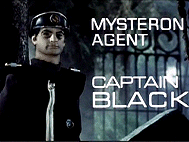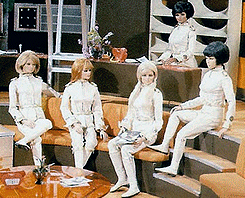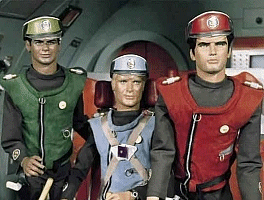
Sixties
City presents
a wide-ranging series of
articles on all aspects of the Sixties, penned by the creator of the iconic
60s music paper Mersey
Beat
 |
||||||
|
Sixties
City presents
a wide-ranging series of
articles on all aspects of the Sixties, penned by the creator of the iconic
60s music paper Mersey
Beat
|
||||||
|
 |
A
Supermarionation puppet series created by Gerry and Sylvia Anderson and
produced by Reg Hill for ITC/Century 21 Television. There were 32 colour
half-hour episodes originally broadcast from September 1967 to May 1968.
In this series Earth has a security organisation called Spectrum in which all the agents are named after colours of the spectrum. In the year 2068, Captain Black travels to Mars, discovers a Martian city and, believing the inhabitants to be hostile, destroys it. The Martians, called Mysterons, want revenge and decide to wage war against Earth, taking control of Captain Black and using him as an indestructible agent against Spectrum. They also kill Captain Scarlet (real name Paul Metcalfe) and revive him through a system called retro-metabolism, but Scarlet remains loyal to Spectrum and uses his power to battle Black and the Mysterons, who are now conducting a war against the Earth. The Supreme Commander of Spectrum is Colonel White, who is based in the aerial headquarters, Cloudbase. The organisation also has a jet fighter force of five female agents called Angels. |
| Symphony
Angel (Karen Wainwright) from Cedar Rapids, Iowa; Melody Angel (Magnolia
Jones) from a cotton farm in the deep South; Rhapsody Angel (Dianne Simms)
from Chelsea in London; Harmony Angel (Chan Kwan) from Tokyo, Japan and
Destiny Angel (Juliette Pontoin) from Paris, France. The puppets of the
Angels were said to be based on some celebrities of the time, Melody was
based on Eartha Kitt and Sylvia Anderson provided her voice; Destiny was
based on Ursula Andress and voiced by Elizabeth Morgan; Rhapsody was based
on Jean Shrimpton and voiced by Elizabeth Morgan; Harmony was based on Tsai
Chin and was voiced in the first episodes by Elizabeth Morgan. Subsequently,
Lian-Shin was hired and voiced Harmony for the rest of the series. Symphony
was voiced by Janna Hill. ATV issued a detailed dossier of every character in the series and the background to the eponymous hero read: “Captain Scarlet is Spectrum’s number one agent and, due to the Mysterons, has the fantastic ability to defy death. He’s English and comes from a family of distinguished soldiers. He is a truly professional agent, carrying out orders fast and efficiently, but off duty is carefree and bursting with energy, popular with all the Spectrum agents and the opposite sex”. The voices of Scarlet, White, Blue, Grey, Magenta, Fawn, Ochre and Green were provided by Francis Matthews, Donald Gray, Ed Bishop, Paul Maxwell, Gary Files, Charles Tingwell, Jeremy Wilkin and Cy Grant respectively. Donald Gray also provided the voices of Captain Black and 'The Mysterons'. In previous Gerry Anderson puppet series, the designs of the marionettes were not made to human proportion because the lip-sync devices were placed in their heads, making them disproportionate to the bodies. For the first time, in this series, the lip-sync devices were placed in the bodies of the puppets, enabling the designers to make marionettes with human dimensions. As with previous Anderson series, there were lots of futuristic machines, including a Spectrum Pursuit Vehicle, Helijet, Passenger Jet and Maximum Security Vehicle. |
 |
 |
The
episode titles were: The Mysterons; Winged Assassin; Big Ben Strikes Again; Manhunt; Avalanche; White As Snow; The Trap; Operation Time; Spectrum Strikes Back; Special Assignment; The Heart of New York; Lunarville 7; Point 783; Model Spy; Seek And Destroy; Traitor; Renegade Rocket; Crater 101; Shadow of Fear; Dangerous Rendezvous; Fire At Rig 15; Treble Cross; Flight 104; Place of Angels; Noose of Ice; Expo 2068; The Launching; Codename Europa; Inferno; Flight to Atlantica ; Attack on Cloudbase; The Inquisition. |
 |
|
Article
|